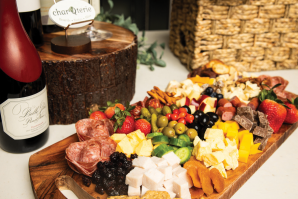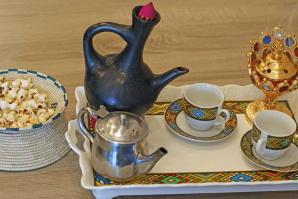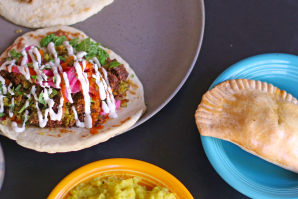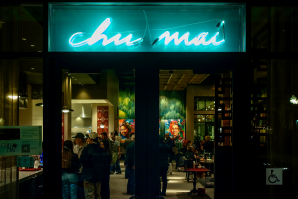Charley Phung chars Saigon cinnamon bark over an open flame, infusing the flavors of pho into a cardamom-flavored simple syrup. He later combines this syrup with a blend of liberica and robusta coffee and shakes it. This is the Shaken Pho Americano, a signature drink at Chloé Cà Phê & Roastery in Midtown Sacramento, which Phung opened with his wife, Crystal Huynh-Kim, on March 22. But the mission of the cafe goes beyond buzzy beverages.
Community plays a huge role for the coffee shop. Huynh-Kim’s parents opened one of the first Vietnamese coffee shops in Sacramento’s Little Saigon called Café Chieu Tim in the 1980s, but they closed it after Huynh-Kim was born. For Phung and his wife, opening their business allows them to honor their roots.
According to the National Coffee Association, we are still deep in the third wave of coffee culture. Flavor notes, latte art, single-origin and pour-over characterize this wave. But curious coffee drinkers have developed refined tastes, leading them to seek new coffee experiences, and that can go beyond the latest light roast. In the Capital Region, coffee entrepreneurs are moving away from cookie-cutter offerings and creating cultural coffee shops that provide unique flavors and rich storytelling.
New beginnings
The Shaken Pho Americano at Chloé Cà Phê & Roastery in Midtown
Sacramento features a cardamom-flavored simple syrup and a blend
of liberica and robusta coffee. (Photo courtesy of Chloé Cà Phê)

Before opening Chloé, named after their daughter, Phung worked for Porsche and Audi on large scale “big brand equity” projects. Following his father’s passing in 2023, Phung learned that his father’s dream was for him to uplift Vietnam, which Phung says is now a frontier market. He called up industry leaders within the Vietnamese community in Vietnam and asked them about the next best thing.
“How do we bring that Vietnamese special scene that’s in Vietnam now to America and show that Vietnamese coffee can be more than just ca phe sua da (coffee with condensed milk)?” Phung says. During the fall of 2024, Phung and his team flew to Vietnam and visited over 30 farms to gain insights into the coffee beans and production processes.
Phung says in late May they will offer coffee omakase, a 60-minute tasting experience of varieties from Vietnam. Aside from selling rare coffee species like liberica, fine robusta and varieties of arabica, Phung says, the cafe provides a “safe space for us to not pass generational trauma from our parents of the war onto the younger kids.” Additionally, it’s also about telling stories. Phung says during their soft opening in February, a visitor stopped by and said, “I know your wife’s dad’s shop. I used to go there. I knew her dad.”
A coffee oasis
Tucked in the Curtis Park neighborhood, owner Abdul Aziz’s Yemeni coffee shop Qisa Coffee is inspired by Peshawar’s Qissa Khawani Bazaar or Storyteller’s Bazaar in Pakistan. Qisa or qissa means story in Arabic, Pashto and Uzbek.
Qisa Coffee serves drinks and sweets inspired by the owners’
Yemeni roots, like this iced pistachio latte and pistachio
cheesecake.

Aziz says Peshawar used to be an international business center, but has since transformed into a city renowned for storytelling. “They invented the position of a storyteller,” he says. “So they would hire the people who heard about the story, and they share it with the people.”
At Qisa, it’s also about stories shared over coffee or chai. Aziz serves karak chai, which is made on a stovetop using a recipe from Peshawar. His coffee is made from mocha beans Aziz imports from Yemen. In the 14th century, coffee cultivation began in the district of Al-Mokha in Yemen, where the coffee beans came to be known as mocha. Aziz says that when the Yemeni coffee beans spread to Europe, Europeans added chocolate to create the drink known as mocha today. The beans have multi-faceted flavors ranging from chocolaty and citrusy to fruity.
Qisa Coffee’s karak chai is made in-house using a recipe from
Peshawar. (Photos by Rachel Valley)

At his pop-up, he serves Turkish coffee. At Qisa, he offers authentic Peshawar and Yemeni flavors, along with seasonal drinks that include ube matcha. He also serves a Dubai chocolate latte. He says it was challenging finding the right quality chocolate but settled on one after visiting with three to four vendors.
“Local coffee shops are changing the industry and presenting them with what they call their flavor,” Aziz says, “and that’s what the consumers are looking for nowadays, so that’s why more and more of these are coming out.”
While Qisa celebrates rich storytelling with an emphasis on the community, Aziz’s goal is for people to sit with each other and create their own stories. “Our coffee shop is just not my story; it’s also the customer’s story,” Aziz says. “A community cannot be built without sharing one single part.”
Coffee and brunch, please
At Tupi Coffee, owner Eduardo Faustino serves high-end brew from coffee beans he purchases directly from a Brazilian farm and then roasts in Midtown. His coffee is from Sul de Minas or South of Minas, one of the four major producing regions in his home state of Minas Gerais.
Tupi Coffee’s Moreno, here paired with fried Brazilian coxinhas,
combines espresso and milk with chocolate, honey and a touch of
cinnamon.

“I always tell my employees, like, if there’s a Michelin star for a coffee shop, I want one,” Faustino says. “How do we serve with excellence every day?” He says he wants people to experience the purity of coffee and suggests people try a drip coffee or cappuccino, which happens to be his favorite order. “If the cappuccino is good, I know your coffee is good, because it’s like an old-fashioned. It’s so easy to make, but it’s so easy to mess up.”
Faustino, who moved his main cafe from Boulevard Park to Southside in 2023 and opened an express Midtown location in 2024, says he notices many people add “so much sugar and vanilla and crema” to their coffee, masking its natural flavors. “You just destroyed the flavor of these precious beans,” Faustino says. “It’s not coffee anymore, it’s just sugar with caffeine.” He says his coffee is low in acidity, not bitter, and has cocoa, red fruit and nutty notes.
Soon, Faustino plans to introduce a buffet-style brunch on Saturdays and Sundays with a chef cooking everything on the spot, adorned with flowers and a DJ playing. “I wanted to have plates and mugs and people be like, ‘Oh, there’s the brunch in the mornings, there’s the bar in the night and there’s the coffee shop during the day.’”
His success is just one sign of the cultural coffee trend percolating in the Capital Region. “We are seeking authenticity through food,” Faustino says. “People are looking for very cultural, niche things.” His advice for fellow entrepreneurs is “do your culture, because nobody can take that from you.”
–
Stay up to date on business in the Capital Region: Subscribe to the Comstock’s newsletter today.
Recommended For You

The Capital Region’s Charcuterie Entrepreneurs Are Turning Grazing into a Gourmet Experience
Charcuterie boards gained national attention from the business crowd in 2022, when Aaron Menitoff and Rachel Solomon Fascitelli, co-founders and co-CEOs of the online cheese and charcuterie gifting business Boarderie, appeared on “Shark Tank,” eventually walking away with a deal from Lori Greiner and generating $70 million in revenue.

Neighborhood Favorite: Kind Bean Cafe and Ethiopian Cuisine
This cafe serves ceremonial Ethiopian coffee — and breakfast burritos
The coffee ceremony at Kind Bean Cafe and Ethiopian Cuisine
unfolds like a sacrament, each tool imbued with significance like
objects on an altar. The beans, roasted and ground throughout the
day, steep in a jebena, an ebony-colored earthenware vessel
developed more than 800 years ago.

The New Fusion Food
Young restaurateurs in the Capital Region are rewriting the definition of authenticity
Capital Region restaurant owners with mixed backgrounds are
channeling their points of view into creative dishes.

Beyond Pho
Capital Region restaurateurs showcase the diversity and fun of Vietnamese cuisine
Combining traditional flavors with influences from California and farther afield, a new generation of restaurateurs are serving a fresh, innovative take on Vietnamese cuisine.




